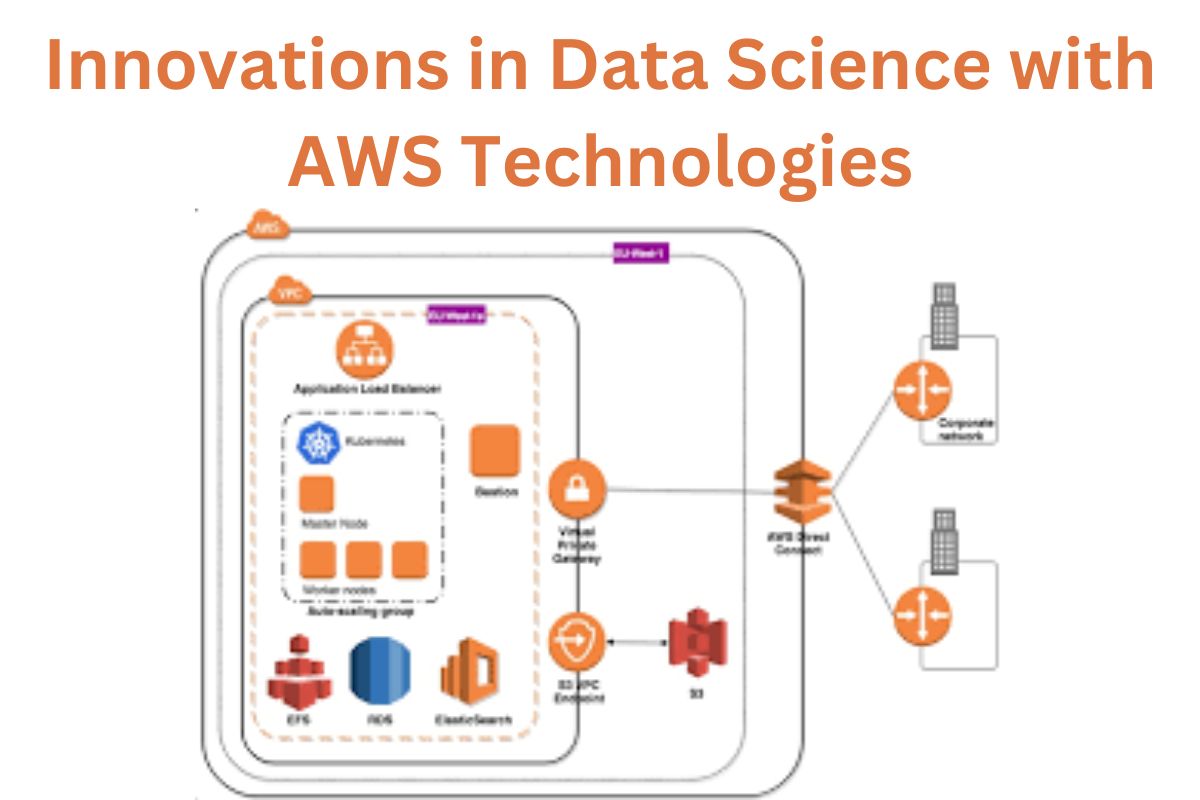Introduction
In recent years, the integration of Data Science with cloud computing has significantly transformed how organizations manage, analyze, and leverage data for decision-making. Amazon Web Services (AWS) is at the forefront of this innovation, providing cutting-edge tools and services that enable businesses to accelerate their data science projects. AWS technologies offer scalable, secure, and efficient solutions, allowing data scientists to perform complex data processing, machine learning (ML), and artificial intelligence (AI) tasks with ease.
What is Data Science?
Data science is an interdisciplinary field that combines statistics, computer science, and domain knowledge to extract insights from structured and unstructured data. It involves data collection, cleaning, analysis, and visualization, enabling organizations to make informed decisions. By leveraging algorithms and machine learning, data scientists uncover patterns, trends, and predictions, driving innovation and enhancing strategic planning across various industries.
What is AWS Technologies?
AWS (Amazon Web Services) is a leading cloud computing platform offering diverse services like scalable computing power, storage solutions, and managed databases. It supports machine learning and analytics, enabling businesses to innovate rapidly. With robust security features and a global infrastructure, AWS provides flexibility and cost efficiency, making it an ideal choice for startups and enterprises seeking to optimize their operations.
Key innovations in Data Science using AWS technologies
1. Scalable Data Storage with Amazon S3
One of the most fundamental requirements for data science is the ability to store large volumes of data securely and access it efficiently. AWS’s Amazon Simple Storage Service (Amazon S3) provides virtually unlimited storage, allowing businesses to store and retrieve any amount of data at any time.
Key Features:
- Durability and Availability: Amazon S3 is designed for 99.999999999% durability, ensuring your data is secure.
- Scalability: As your data grows, Amazon S3 scales automatically without any need for manual intervention.
- Cost-effective Storage Tiers: S3 offers different storage tiers, including S3 Standard, S3 Glacier (for archival), and more, optimizing costs based on your usage.
Data scientists can store raw, structured, or unstructured data in S3, making it the backbone for many AWS data science services.
2. Big Data Processing with AWS Glue and Amazon EMR
Data science often involves processing massive datasets, which can be challenging with traditional infrastructures. AWS provides powerful tools like AWS Glue and Amazon EMR (Elastic MapReduce) to tackle big data processing tasks efficiently.
- AWS Glue: A fully managed ETL (Extract, Transform, Load) service that makes it easy to prepare and transform data for analytics. It automates much of the heavy lifting in cleaning and cataloging data from multiple sources.
- Amazon EMR: Ideal for large-scale data processing, EMR allows data scientists to use open-source tools like Hadoop, Spark, and Presto to process huge datasets quickly. You can run machine learning algorithms, perform data mining, and do batch processing with minimal setup.
These services ensure that data scientists can focus on analysis rather than worrying about infrastructure.
3. Machine Learning with Amazon SageMaker
One of the most significant innovations AWS brings to data science is Amazon SageMaker, a fully managed service that simplifies machine learning (ML) development. SageMaker allows data scientists to build, train, and deploy ML models at scale.
Key Features of SageMaker:
- Pre-built Algorithms: SageMaker offers a variety of pre-built machine learning algorithms, which eliminates the need to code algorithms from scratch.
- One-Click Training and Deployment: Data scientists can train models with one click using powerful compute instances and then deploy them easily for real-time inference.
- AutoML with SageMaker Autopilot: For users without extensive machine learning expertise, Autopilot automatically builds and tunes the best ML models based on your data.
SageMaker reduces the complexity of machine learning projects and makes it accessible to businesses of all sizes.
4. Serverless Data Analytics with AWS Lambda and AWS Step Functions
AWS enables serverless computing, which lets data scientists run code without managing servers. AWS Lambda and AWS Step Functions are two serverless services that can be integrated into data science workflows.
- AWS Lambda: It allows you to run small pieces of code (functions) in response to data events or changes. For instance, Lambda can trigger data processing jobs or perform real-time transformations when new data arrives in Amazon S3.
- AWS Step Functions: A service that coordinates multiple AWS services into workflows. Data scientists can automate multi-step processes, such as data extraction, transformation, model training, and inference, without worrying about infrastructure.
Serverless technologies streamline workflows, making it easier to experiment with data and scale as needed.
5. Data Warehousing and Analytics with Amazon Redshift
For businesses that need fast querying and analytics on structured data, Amazon Redshift is a high-performance data warehouse service. Redshift can analyze large datasets, allowing data scientists and analysts to generate reports, visualize data, and gather insights in near real-time.
Key Advantages of Amazon Redshift:
- Massive Parallel Processing (MPP): This enables high-speed querying and data processing across multiple nodes.
- Redshift Spectrum: Allows you to query data directly from Amazon S3 without needing to load it into the Redshift warehouse.
- Integrations with BI Tools: Redshift integrates with popular business intelligence (BI) tools like Tableau, Power BI, and Amazon QuickSight for easy visualization.
Amazon Redshift accelerates the analysis of large datasets, making it ideal for business intelligence and data science use cases.
6. AI Services for Automation
AWS also offers several managed AI services that allow businesses to incorporate pre-built AI models without needing to build them from scratch. These services make it easy to integrate AI into your data science workflows:
- Amazon Rekognition: A service that enables image and video analysis for tasks like object detection and facial recognition.
- Amazon Comprehend: Natural Language Processing (NLP) services that can analyze text to detect sentiment, extract entities, and understand language context.
- Amazon Polly: A text-to-speech service that converts written text into lifelike speech.
These AI services help automate and scale tasks that would otherwise require substantial manual effort.
7. Security and Compliance with AWS
Data privacy and security are top priorities in any data science project. AWS provides multiple layers of security to ensure that your data is safe throughout its lifecycle.
Key Security Features:
- Identity and Access Management (IAM): AWS IAM helps you manage access to AWS services and resources securely.
- Encryption: Services like Amazon S3, RDS, and Redshift provide data encryption options for data at rest and in transit.
- Compliance Certifications: AWS complies with global security standards and offers compliance certifications like HIPAA, GDPR, SOC, and ISO.
These security features ensure that businesses can trust AWS with their sensitive data while focusing on innovation.
8. Real-Time Data Streaming with Amazon Kinesis
For businesses that deal with real-time data, Amazon Kinesis is a service that collects, processes, and analyzes streaming data in real-time. This service is crucial for use cases like monitoring, predictive analytics, and real-time decision-making.
Key Features of Amazon Kinesis:
- Kinesis Data Streams: Captures and processes continuous streams of data, allowing you to build real-time applications.
- Kinesis Data Analytics: Lets you run SQL queries on streaming data for real-time insights.
- Kinesis Firehose: Automatically delivers real-time data to AWS storage services like S3 and Redshift.
Kinesis allows data scientists to work with real-time data without any delays, providing instant insights and enabling quicker responses.
Conclusion
AWS offers a robust ecosystem of technologies and services that empower data scientists to innovate, scale, and accelerate their projects. From scalable storage solutions like Amazon S3 to advanced machine learning tools like Amazon SageMaker, AWS provides everything needed to unlock the full potential of data science. By leveraging these innovations, businesses can harness the power of their data to drive smarter decision-making and achieve competitive advantages in their industries.
For those looking to master these tools and skills, enrolling in the Best Data Science Training in Noida, Delhi, Gurgaon, and other locations in India will provide practical insights and hands-on experience, making AWS a powerful ally in your data science journey.
FAQs: Innovations in Data Science with AWS Technologies
1. What are the key AWS services for data science?
AWS offers several key services for data science, including Amazon SageMaker for building and deploying machine learning models, Amazon Redshift for data warehousing, and AWS Glue for data integration.
2. How does Amazon SageMaker enhance data science workflows?
Amazon SageMaker streamlines the machine learning process by providing tools for data labeling, training, tuning, and deployment, enabling data scientists to focus on model performance rather than infrastructure management.
3. Can AWS help with big data analytics?
Yes, AWS provides services like Amazon EMR for processing big data using frameworks like Hadoop and Spark, and Amazon Athena for serverless querying of large datasets, making it easier to derive insights from big data.
4. What role does AWS Lambda play in data science?
AWS Lambda enables serverless computing, allowing data scientists to run code in response to events without provisioning servers. This can automate data processing tasks and streamline workflows.
5. How does AWS ensure data security in data science projects?
AWS provides a range of security features, including encryption, IAM (Identity and Access Management), and compliance certifications, ensuring that data science projects meet stringent security requirements.
Read Also : https://technonetwork.co.in/revolutionizing-data-analytics-with-ai/




2 thoughts on “Innovations in Data Science with AWS Technologies”